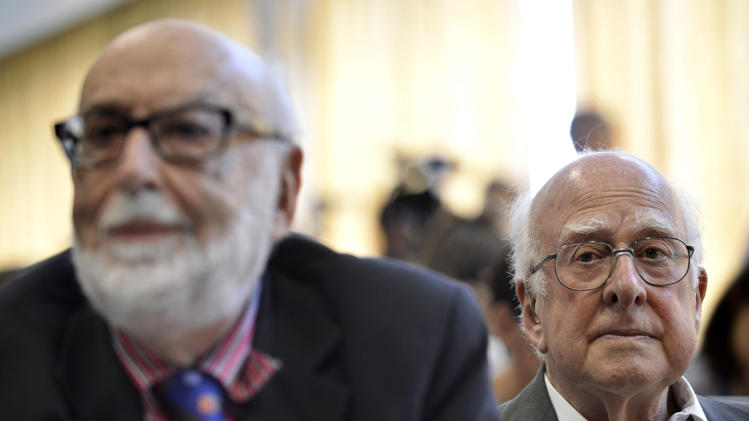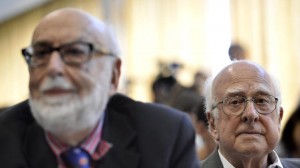
Two scientists have won the Nobel prize in physics for their work on the theory of the Higgs boson. Peter Higgs, from the UK, and Francois Englert from Belgium, shared the prize.
In the 1960s they were among several physicists who proposed a mechanism to explain why the most basic building blocks of the Universe have mass. The mechanism predicts a particle – the Higgs boson – which was finally discovered in 2012 at the Large Hadron Collider at the European Organization for Nuclear Research (CERN), in Switzerland.
“This year’s prize is about something small that makes all the difference,” said Staffan Normark, permanent secretary of the Royal Swedish Academy of Sciences.
‘On holiday’
Professor Higgs is renowned for shying away from the limelight, and he could not be located for interview in the immediate aftermath of the announcement.
“He’s gone on holiday without a phone to avoid the media storm,” his Edinburgh University physics colleague Alan Walker told UK media, adding that Higgs had also been unwell.
But the university released a prepared statement from Higgs, 84, who is an emeritus professor of theoretical physics: “I am overwhelmed to receive this award and thank the Royal Swedish Academy,” he said.
“I would also like to congratulate all those who have contributed to the discovery of this new particle and to thank my family, friends and colleagues for their support. “I hope this recognition of fundamental science will help raise awareness of the value of blue-sky research.”
Francois Englert, 80, said he was “very happy” to win the award, speaking at the ceremony via phone link.
“At first I thought I didn’t have it [the prize] because I didn’t see the announcement,” he told the committee, after their news conference was delayed by more than an hour.
Higgs was born in Newcastle upon Tyne, but it was in Edinburgh in 1964 that he had his big idea – an explanation of why the matter in the Universe has substance, or mass.
His theory involved a missing particle in the Standard Model of physics, which has come to be known as the Higgs boson.
Within weeks, Francois Englert independently published his own, similar theory, alongside his now deceased colleague Robert Brout.
Three other physicists – Gerald Guralnik, Tom Kibble and Carl Hagen – also made key contributions to the theory, and spoke at the announcement of the discovery of the Higgs boson in 2012.
Hagen has long argued for the name of the particle to be changed, protesting at the “rock star” status in which Higgs is held.
And Higgs, too, has expressed his discomfort with the attention he has received, preferring to call the particle “the scalar boson”.
In a statement on Tuesday, Kibble, of Imperial College London, said he was “glad” the Nobel Prize had gone to the work of Higgs and Englert.
“My two collaborators, Gerald Guralnik and Carl Hagen, and I contributed to that discovery, but our paper was unquestionably the last of the three to be published.
“It is therefore no surprise that the Swedish Academy felt unable to include us, constrained as they are by a self-imposed rule that the prize cannot be shared by more than three people.
“My sincere congratulations go to the two Prize winners, Francois Englert and Peter Higgs.”
International effort
Proving their theory correct took almost half a century and involved creating the biggest and most sophisticated machine humankind has ever built.
The Large Hadron Collider (LHC) at Cern lies in a circular tunnel almost 17 miles round. It’s so big it’s partly in Switzerland, partly in France. It took 10 years and thousands of scientists and engineers to build it.
Cern director general Rolf Heuer said he was “thrilled” that this year’s prize had gone to particle physics.
“The discovery of the Higgs boson at Cern… marks the culmination of decades of intellectual effort by many people around the world,” he said.
The Nobel Prizes – which also cover chemistry, medicine, literature, peace and economics – are valued at 10m Swedish Krona. Laureates also receive a medal and a diploma.
The official citation for Englert and Higgs read: “For the theoretical discovery of a mechanism that contributes to our understanding of the origin of mass of subatomic particles, and which recently was confirmed through the discovery of the predicted fundamental particle, by the Atlas and CMS experiments at Cern’s Large Hadron Collider”.
David Willetts, UK minister for universities and science, said the award was “an incredible endorsement of the quality of UK science”.
Prime Minister David Cameron said: “This brilliant achievement is richly deserved recognition of Peter Higgs’ lifetime of dedicated research and his passion for science. It is also a credit to the world-leading British universities in which this research was carried out.
“It took nearly 50 years and thousands of great minds to discover the Higgs boson after Professor Higgs proposed it, and he and all those people should be extremely proud.”
By James Morgan


